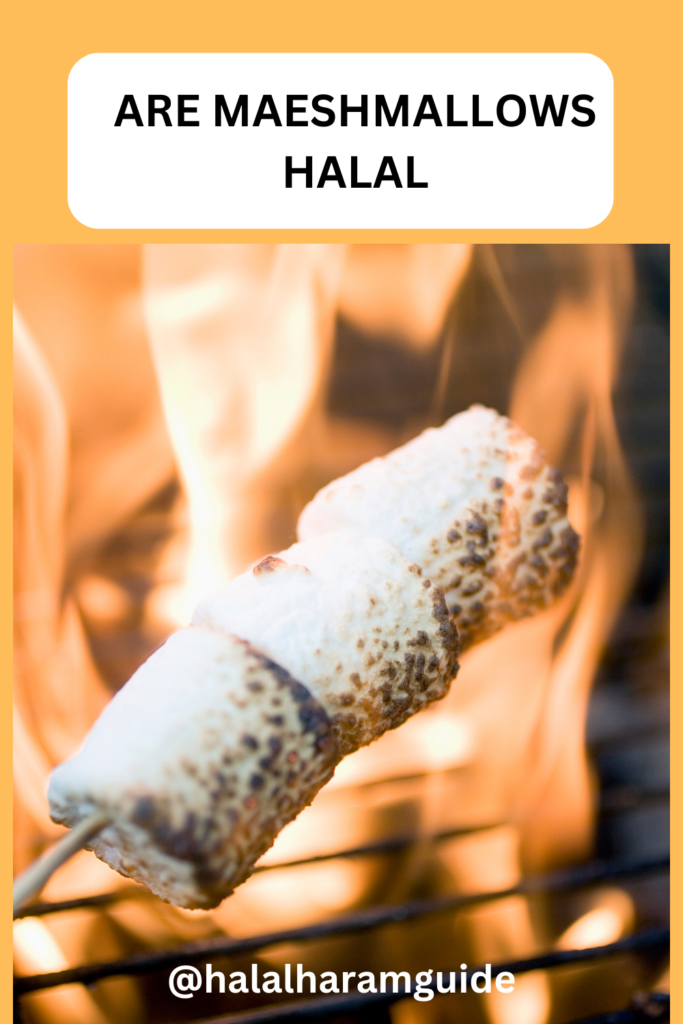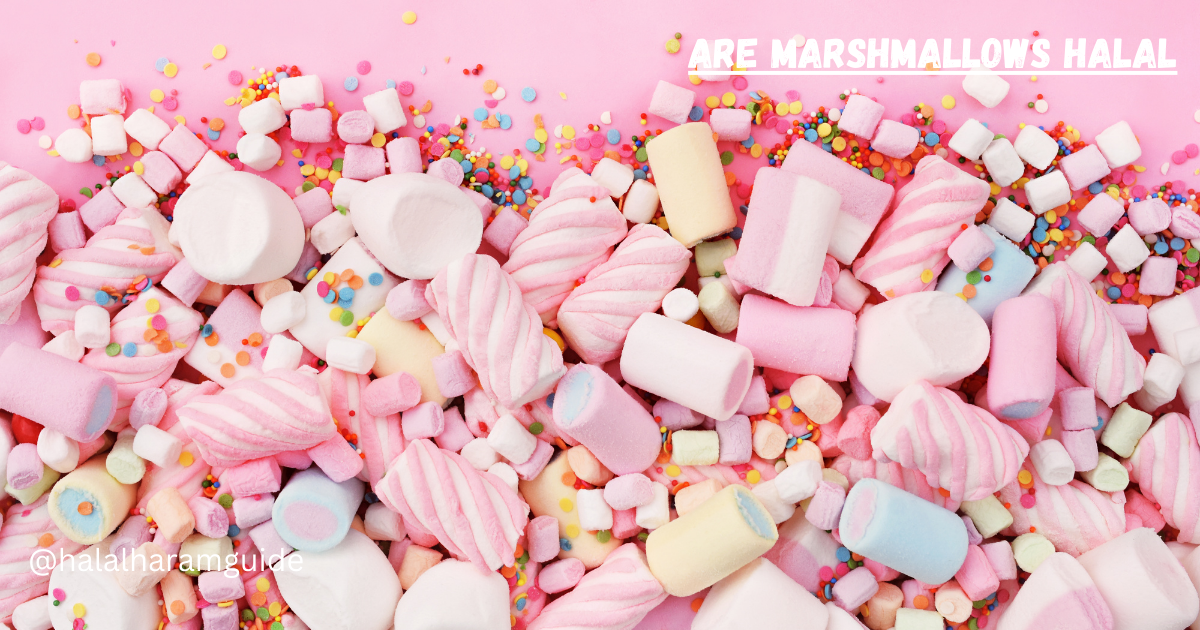In the world of dietary preferences and religious observance, the question often arises: “Are marshmallows halal?”
Understanding the halal status of marshmallows is essential for individuals who adhere to Islamic dietary guidelines. In this blog post, we’ll delve into the intricacies of marshmallow ingredients, the source of their gelatin, and shed light on whether these delightful treats align with halal dietary practices.
Join us as we explore the marshmallow world through the lens of halal consumption.
Are Marshmallows Halal Or Haram?
The halal or haram status of marshmallows depends on the specific ingredients and how they are sourced. Here are the key considerations:
Gelatin Source: Traditional marshmallows often contain gelatin, which can be derived from various sources, including pork, beef, fish, or plant-based alternatives. Marshmallows made with gelatin from pork are generally considered haram (forbidden) in Islamic dietary guidelines. However, marshmallows made with gelatin from halal-certified sources, such as bovine (beef) or fish gelatin, are considered halal (permissible) by many Islamic authorities. The source of the gelatin is a critical factor in determining whether marshmallows are halal or haram.
Additional Ingredients: Besides gelatin, marshmallows may contain other ingredients like flavorings, colorings, and sweeteners. It’s essential to check the entire list of ingredients for any non-halal components or additives.
Halal Certification: To ensure that marshmallows are halal, many individuals and communities rely on products that carry a recognized Halal certification from a reputable certifying authority. These certifications confirm that the product meets Islamic dietary requirements.
Vegan and Plant-Based Marshmallows: Some marshmallow brands offer vegan and plant-based marshmallows that do not contain gelatin or any animal-derived ingredients. These are considered halal and suitable for vegetarians and vegans as well.
What Makes Marshmallow Halal or Haram?
What makes a marshmallow halal or haram is primarily the source of the gelatin used in its production. If the gelatin is derived from halal sources, such as beef or fish, the marshmallow is considered halal.
However, if the gelatin comes from non-halal sources, particularly pork, the marshmallow is haram (forbidden) for Muslims to consume.
Additionally, other haram ingredients or cross-contamination during manufacturing can also affect the halal status of marshmallows.
How Are The Halal Marshmallows Made?
Halal marshmallows are made using a similar process to traditional marshmallows, with the key difference being that all ingredients used must adhere to Islamic dietary laws (halal) during production. Here’s a general overview of how halal marshmallows are typically made:
Ingredients:
Sugar: Granulated sugar is a primary ingredient in marshmallow production, and it is halal as long as it does not contain any alcohol-based flavorings or additives.
Corn Syrup: Corn syrup is often used to sweeten and stabilize the marshmallow mixture. As long as it doesn’t contain any haram (forbidden) additives, it can be used in halal marshmallow production.
Water: Purified water is used to dissolve and mix the ingredients.
Flavorings and Colorings: Halal-certified flavorings and colorings can be added for taste and appearance. It’s essential to ensure that these additives are halal-compliant.
Production Process:
Mixing: The sugar, water, and gelatin substitute (agar-agar, carrageenan, or pectin) are mixed together in a large kettle or mixing bowl. The mixture is heated and stirred until all the ingredients are dissolved and combined.
Boiling: The mixture is then boiled, usually reaching a specific temperature to achieve the desired consistency. This step also involves cooking the sugar to create a syrup.
Whipping: Once the syrup reaches the correct temperature and consistency, it is removed from heat and whipped to incorporate air. This process gives marshmallows their fluffy texture.
Flavors and Colors: Flavorings and colorings can be added at this stage. These ingredients must be halal-certified.
Molding and Setting: The marshmallow mixture is poured into molds or onto trays, where it is left to cool and set. This can take several hours.
Cutting and Packaging: After setting, the marshmallow block is typically cut into individual marshmallows, dusted with a mixture of powdered sugar and cornstarch to prevent sticking, and then packaged for sale.
Forming of Halal Marshmallows
The production of Halal marshmallows involves several key stages, each carefully executed to ensure compliance with Halal dietary requirements.
The first step in creating Halal marshmallows is the formulation of the ingredients. Only Halal-certified ingredients are used, including gelatin derived from permissible sources or plant-based alternatives like agar-agar or carrageenan, which do not violate Islamic dietary laws.
Cooling the Halal Marshmallows
After the marshmallow mixture is prepared and flavored to perfection, it undergoes the critical cooling process.
During this phase, the hot, gooey marshmallow mixture is carefully cooled to allow it to solidify.
This step is crucial to achieve the desired soft and chewy texture that marshmallows are known for, while maintaining Halal compliance.
Packaging the Halal Marshmallows
Once the Halal marshmallows have achieved their ideal texture and consistency, they are ready for packaging.
The packaging process is conducted in accordance with Halal guidelines, ensuring that the packaging materials and procedures do not compromise the Halal status of the product.
This includes avoiding cross-contamination with non-Halal products and using packaging materials that meet Halal certification standards.
Why Is Gelatin Used In Marshmallows?
Gelatin is used in marshmallows for several important reasons:
Texture and Consistency: Gelatin is a protein derived from animal collagen, and it has the unique ability to form a stable gel when mixed with water and heated, and then allowed to cool. This property is crucial for marshmallows because it gives them their characteristic soft, chewy, and spongy texture. Gelatin helps trap air bubbles within the marshmallow mixture, creating the light and fluffy structure that people associate with marshmallows.
Binding Agent: Gelatin acts as a binder that holds the ingredients in marshmallows together. When it’s mixed with sugar, water, and other flavorings, it helps create a smooth and cohesive mixture, preventing the ingredients from separating as they cool and set.
Versatility: Gelatin is versatile and can be used to make marshmallows of various shapes and sizes. It can also be easily flavored and colored to create a wide range of marshmallow flavors and appearances.
Stability: Marshmallows made with gelatin have a longer shelf life compared to those made without it. The gelatin helps prevent crystallization and maintains the marshmallows’ freshness and texture over time.
Ease of Manufacturing: Gelatin-based marshmallows are relatively easy to manufacture on a large scale, making them a cost-effective choice for commercial production.
Ingredients Used In Marshmallows
Marshmallows typically contain the following ingredients:
Sugar
Corn Syrup or Corn Syrup Solids
Water
Gelatin
Vanilla Extract
Salt
Do Marshmallows Have Pig Fat?
Marshmallows can contain an ingredient called gelatin, which is a common gelling agent used in their production. Gelatin is derived from animal collagen, and traditionally, it has often been sourced from pigs or cows.
However, it’s important to note that not all marshmallows contain pig fat, as there are alternative sources of gelatin available. In recent years, some manufacturers have started using gelatin derived from other animals, such as fish or beef, to cater to consumers with dietary restrictions or religious beliefs that prohibit the consumption of pork.
Additionally, there are vegan marshmallow options available that do not contain any animal-derived ingredients, using plant-based alternatives like agar-agar or carrageenan as gelling agents.
Therefore, whether or not marshmallows contain pig fat depends on the specific brand, recipe, and the type of gelatin or gelling agent used in their production. If you are concerned about the source of gelatin in marshmallows, it’s advisable to check the product’s ingredients or look for brands that offer Halal or vegetarian/vegan marshmallow options.
Some Halal Marshmallow Brands
As of my last knowledge update in September 2021, several brands were known to offer Halal marshmallow options. However, the availability of specific brands and products may vary by location and can change over time. It’s always a good idea to check the product labels and contact the manufacturer directly for the most up-to-date information on Halal marshmallow options. Some of the brands that were known for offering Halal marshmallows include:
Ziyad:
Ziyad is a well-known brand that produces a variety of Halal-certified food products, including marshmallows.
Suzanne’s Specialties:
Suzanne’s Specialties offers marshmallow products that are certified Halal, as well as vegan marshmallow creme.
Sweet Apricity:
Sweet Apricity is known for its dairy-free and paleo-friendly marshmallows, which are also Halal certified.
Dandies:
Dandies is a popular brand offering vegan marshmallows that are free from gelatin and other animal-derived ingredients, making them suitable for Halal diets as well.
Conclusion
In conclusion, whether marshmallows are halal or not depends on their ingredients, specifically the source of the gelatin used. Marshmallows made with halal-certified gelatin from permissible sources, such as beef or fish, are generally considered halal.
It’s essential for individuals who follow a halal diet to carefully check product labels, seek Halal certification, and verify the source of gelatin to ensure that the marshmallows they consume adhere to Islamic dietary guidelines.
Additionally, vegan and plant-based marshmallows are a halal-friendly alternative for those who wish to avoid animal-derived ingredients altogether.
FAQ’S
Do All Marshmallows Have Pork Gelatin?
No, not all marshmallows contain pork gelatin. While gelatin is a common ingredient in traditional marshmallows, its source can vary. Gelatin can be derived from pork, beef, fish, or other sources. Some marshmallow brands and products use alternative sources of gelatin, such as fish gelatin or beef gelatin, to cater to consumers with dietary restrictions or religious beliefs that prohibit the consumption of pork. Additionally, there are vegan marshmallow options available that do not contain any animal-derived ingredients, including gelatin.
Is it Gelatin Haram or Halal?
The permissibility of gelatin (whether it is considered halal or haram) depends on its source and the specific interpretation of Islamic dietary laws by different scholars and authorities. Gelatin derived from pork is generally considered haram (forbidden) in Islamic dietary guidelines. However, gelatin obtained from halal-certified sources, such as bovine (beef) or fish gelatin, is considered halal (permissible) by many Islamic authorities. The acceptability of gelatin in a halal diet can vary among individuals and communities.
Are Jet-Puffed Marshmallows Haram?
Jet-Puffed is a brand of marshmallows produced by Kraft Heinz. Some Jet-Puffed marshmallow products may contain pork-derived gelatin, making them haram for individuals who follow Islamic dietary laws. However, Kraft Heinz also offers some marshmallow products that are labeled as halal, so it’s essential to check the specific product’s ingredients and Halal certification if you are concerned about its halal status.
Are Marshmallows Halal in UAE?
Whether marshmallows are considered halal in the United Arab Emirates (UAE) depends on the specific brand and product. Many international brands with Halal-certified products are available in the UAE, including marshmallows. Consumers in the UAE can find marshmallow products labeled as halal to ensure they meet Islamic dietary requirements. It’s advisable to check the packaging for Halal certification or consult local authorities for a list of Halal-certified products available in the UAE.
- “Is Lobster Halal? Understanding Its Permissibility”
- “Is Drawing Haram in Islam? Understanding the Perspective”
- “Is Fermented Kimchi Halal? Exploring Kimchi’s Halal Status”
- “Is Collagen Halal? Unveiling the Halal Status of Collagen”
- “Is Wine Vinegar Halal? Unveiling Its Permissibility”


